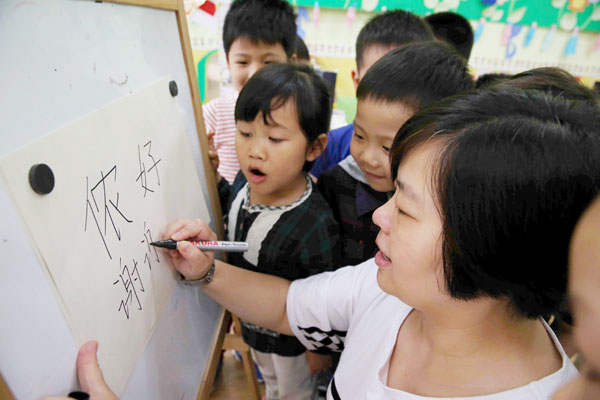Save the word
Updated: 2013-06-12 02:25
By Wu Ni (China Daily)
|
||||||||
Education authorities worry over native tongue's extinction and are taking action, Wu Ni reports in Shanghai
Children in Shanghai will be expected to learn the local dialect in kindergarten, as the city's education authorities plan to enhance folk culture education among the youth.
Qian Cheng, a political adviser in Shanghai, made a proposal earlier this year to introduce Shanghai dialect education to kindergartners.
 |
|
Local dialect is taught at some kindergartens in Shanghai as part of a pilot program to preserve the language.Gao Erqiang / China Daily |
Qian, who is also deputy director of the Shanghai Comic Troupe and has performed many plays in the local dialect, said he's worried about the endangered situation of the city's mother tongue.
"In the primary schools where I give voluntary Shanghai dialect classes, most pupils either speak it broken or cannot master the language at all," he said.
"The Shanghai dialect is the pillar of Shanghai's culture," he added. "How can we protect and pass down the culture if we lose our mother tongue?"
Qian found that many children can speak some of the dialect before they enter kindergarten. However, after speaking Putonghua, or Mandarin, regularly in class, they get in the habit of speaking it at home, which influences parents to adopt the language as well.
The case is true for Shanghai native Shen Yanwei and his family. His 6-year-old daughter can hardly speak the dialect now.
"My daughter speaks Putonghua in kindergarten. The cartoons and TV programs she watches are all in Putonghua. Gradually, we have begun to speak Putonghua with her," Shen said.
He added that he did not believe that the loss of the dialect is an issue as most parents attach more importance to their children's ability to speak English.
China began to promote Putonghua in 1992, in a nationwide campaign that strongly encouraged the use of Putonghua in classrooms. But many schools, according to Qian, have extended the use of the language to after-school activities.
Qian suggested that public kindergartens spare an hour a day to offer children games, storytelling and ballad singing in the local dialect, because children ages 3 to 6 are free of academic burden and in an important period for language acquisition.
Meanwhile, Shanghai's universities can help by contributing teachers who are experts on preschool education as well as the Shanghai dialect. Qian also suggests inviting linguists and scholars to write a textbook suitable for preschool children about grammar and pronunciation as well as the history and culture of the local dialect.
The Shanghai Municipal Education Commission, according to Qian, has acknowledged the proposal and will start a pilot program bringing the Shanghai dialect into a test group of kindergartens and eventually to all when enough experience is gained.
Some of the city's kindergartens have already introduced the Shanghai dialect to their curriculum.

 Michelle lays roses at site along Berlin Wall
Michelle lays roses at site along Berlin Wall
 Historic space lecture in Tiangong-1 commences
Historic space lecture in Tiangong-1 commences
 'Sopranos' Star James Gandolfini dead at 51
'Sopranos' Star James Gandolfini dead at 51
 UN: Number of refugees hits 18-year high
UN: Number of refugees hits 18-year high
 Slide: Jet exercises from aircraft carrier
Slide: Jet exercises from aircraft carrier
 Talks establish fishery hotline
Talks establish fishery hotline
 Foreign buyers eye Chinese drones
Foreign buyers eye Chinese drones
 UN chief hails China's peacekeepers
UN chief hails China's peacekeepers
Most Viewed
Editor's Picks

|

|

|

|

|

|
Today's Top News
Shenzhou X astronaut gives lecture today
US told to reassess duties on Chinese paper
Chinese seek greater share of satellite market
Russia rejects Obama's nuke cut proposal
US immigration bill sees Senate breakthrough
Brazilian cities revoke fare hikes
Moody's warns on China's local govt debt
Air quality in major cities drops in May
US Weekly

|

|







